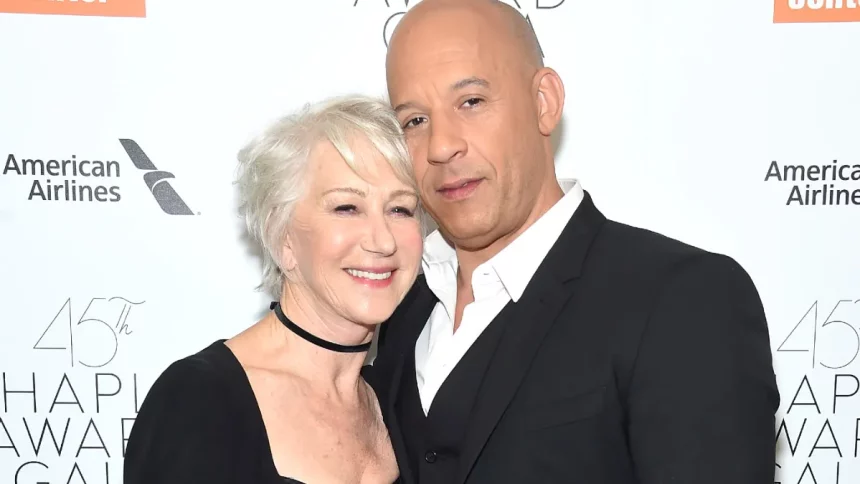Helen Mirren is a serene, majestic actress. Who would have thought she could be caught in a storm of controversy? A cloud of controversy has appeared over Hollywood’s horizon, as Mirren has played Israel’s ex-prime minister Golda Meir in a film that has ignited not only stunning performances but also heated debates.
She is a venerable actress, known for her many and varied roles. Now, she’s battling a heated debate about identity, authenticity, and Hollywood casting.
Women in Gold, Debt, and The Debt showed Mirren in Jewish roles beautifully. But this story, which she calls an “uber Jewish role”, is a little more complex.
Helen bravely stepped into the body of a character with symbolism and navigated through the heavy prosthetics.
Even for roles that are essentially Jewish, she embraced the role, with respect. However, the casting controversy has left her on a razor’s edge, as many believe Jewish actors have been overlooked for non-Jewish actors. We’ll get down to the truth and see if we can find any photos of nudity. Can’t you readers stop yourself?
What is more important: breaking boundaries or bridging gaps?
Guy Nattiv saw Helen, as his Golda and was not bothered by the fact that she is non-Jewish. According to Nicholas Martin, it was the stamp of approval by Meir’s grandson Gideon that helped Helen land her role.
Mirren was willing to accept the broader debate on the authenticity of casting, but she would not have been able to join the project if it had become the focus of the story. She joined with excitement when the director made clear that he wanted her involved.
Why does Hollywood, an area with deep Jewish roots, so often overlook Jewish actors when it comes to the quintessential Jewish role? David Baddiel explains in The Guardian that this is not a story untold.
The critic points out that despite the Jewish influence on the film industry, Jewish actors are often sidelined in favor of roles that seem ripped from their cultural and historical narrative. This critic cites various examples, such as Gary Oldman’s portrayal of Herman Mankiewicz, or the cast in Friday Night Dinner which tread on similar and paradoxical terrain.
The Artistic Expression and the Ethical Casting
Martin’s musings on ever-shrinking guidelines for casting and creating stories raised questions and eyebrows, pointing to a growing authoritarianism within the entertainment industry.
Is artistic freedom still a part of the conversation in today’s society, when every casting is met with a range of opinions and discussions? Helen Mirren’s portrayal of Golda Meir is a case in point. The authenticity of the portrayal has been both praised and criticized. Martin reveals that even an Israeli historian commended Helen Mirren for being “more Golda than Golda”.
Helen’s character was a tough and feisty one
Mirren smoked a chain and planned Israel’s Yom Kippur War of 1973 with an aplomb that was in contrast to her calm exterior. Mirren’s performance is a testament to an artist who has dedicated themselves to portraying a character in fidelity and depth, despite the criticism.
Golda’s Realm – A Canvas of War and Politics
Despite being a film that is intricately woven around political and military strategies, a scene between Meir, played by Liev Schreiber and Henry Kissinger (Liev Schreiber) brought a spark into the story.
The cleverly delivered “In this nation, we read left to right” gave a glimpse of the strategic, fierce mind behind Meir. The film is criticized for being a bit lackluster. It’s drenched in solemnity, and the seriousness can be overwhelming.
Golda pushed Helen through stoic smoking scenes, intense war strategy dialogues, and casting controversy into an area where they all became intertwined. Mirren navigates the film with ease, but it stumbles at times when trying to combine personal portraits and political drama.
Lifting the curtains on authenticity in Casting
It’s not just about Helen and her powerful performance. Nor is it about the potency of this film. This is a larger narrative that encompasses the ethics of Hollywood casting and their choices.
This raises questions about our notions of representation and authenticity. It also asks whether an actor can or should, despite their unmatched talent, step into characters that are embedded with rich cultural or historical stories. In an industry in which representation and authenticity are key dialogues, is the casting of Helen Mirren to play Golda Meir a lost opportunity for Jewish representation or a triumphant artistic freedom?












